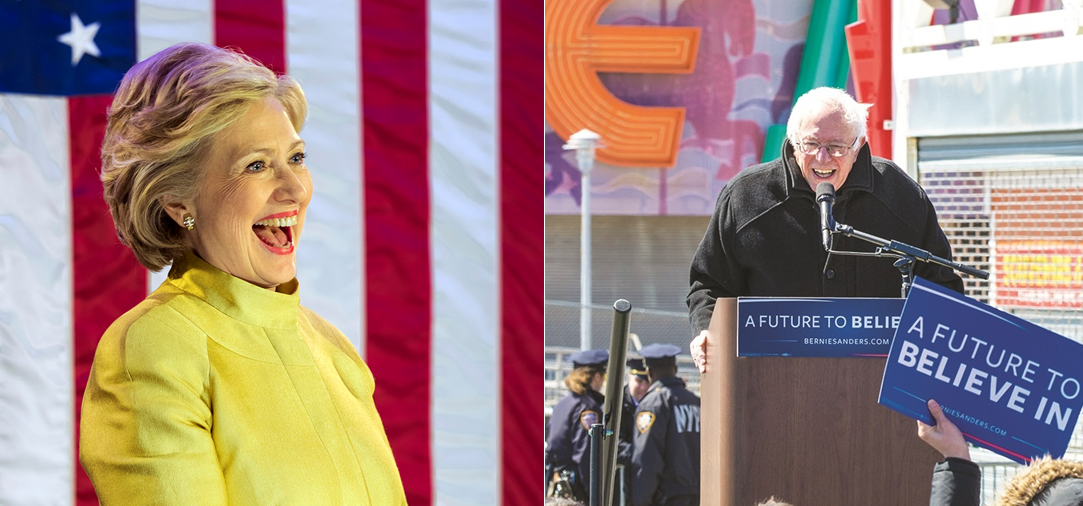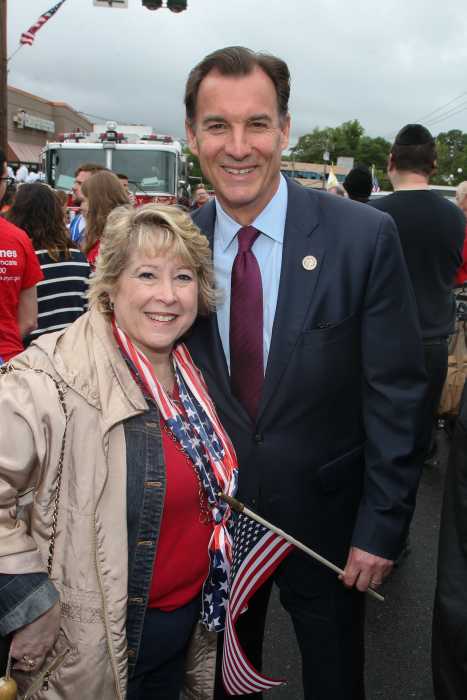Shouting over each other and the questioners at times, Democratic presidential hopefuls Hillary Clinton and Bernie Sanders strove to show the differences between themselves during a wild debate Thursday night at the Brooklyn Navy Yard.
The showdown, which took place just five days prior to the potentially pivotal New York primary, was held before an audience of insiders from political circles and the media inside the Duggal Greenhouse, with a phalanx of police outside to provide security. It was not open to the general public, but was televised on CNN and NY1, the debate’s sponsors.
Both candidates made their points — sometimes politely, sometimes by interrupting the other — as they argued the validity of their respective positions.
Clinton stood on the side of incremental change that she contended represented important movement forward on a range of issues from health care to civil rights. Sanders called for what would, in many ways, be a new American revolution, taking money out of politics and upending the economic system so that the middle class and working class could get the fair share that has been systematically redistributed to the “1 percent” over the past several decades.
Candidates, Sanders said, can’t take contributions from “Big Money” and “then stand up to these special interests,” and charged — as he has throughout the campaign — that Clinton’s ties with Wall Street, represented by her making speeches to Goldman Sachs for which she was paid hundreds of thousands of dollars, would hobble her when it comes to reining in corporate excesses that have enriched the wealthy while leaving the middle and working class in the dust.
“I disagree with Secretary Clinton in the belief that you can get money from Wall Street,” he contended, “and, at the end of the day, do what has to be done for the working families of this country.”
But, Sanders added, there is strength in numbers and, “This country, if we stand together and not let the Trumps of the world divide us up, can guarantee health care, can have paid family and medical leave, can have public colleges tuition free, can lead the world in transforming our energy system, can break up the large financial institutions, can demand that the wealthiest people in this country start paying their fair share of taxes. We can do that when millions of people stand up, fight back and create a government that works for all of us, not just the 1 percent.”
Clinton hit back on numerous fronts including the fact that Sanders has yet to release his tax returns. In response, noting that his wife Jane did the taxes and that they both have “been a little bit busy lately,” Sanders promised that the couple’s 2014 taxes would be released the day after the debate, Friday, April 15.
“They are very boring tax returns,” he added. “Unfortunately, I remain one of the poorer members of the U.S. Senate.”
Clinton, for her part, reminded her listeners that they “took a chance” on her before, when they elected her and then re-elected her to be a U.S. senator from New York.
“During those years,” she said, “we worked closely together. I tried to have your back and, time and time again, you had mine.”
Listing accomplishments ranging from rebuilding New York after the 9/11 terrorist attacks and helping the first responders who grew ill from working at Ground Zero, to creating jobs, “despite the disastrous policies of George W. Bush across New York,” Clinton told her listeners, “We stood up, time and time again, against all kinds of vested and powerful interests.”
She said she wanted to “take what we did in New York, and to take those New York values, to the White House, and put them to work on behalf of all our people.”
“Of course, we have economic barriers,” Clinton continued. “I have been fighting against those, trying to even the odds, most of my adult life. But, we also have racial barriers, gender barriers, homophobic barriers, disability barriers. We have a lot of barriers that stand in the way of people being treated as they should and having the opportunity to live up to their own God-given potential.”
“I won’t just make promises I can’t keep,” she added, a reference to her oft-repeated assertion that Sanders’ signature issues, such as universal health care and free tuition at public colleges, are pies in the sky. “I will deliver to improve your lives.”
But, Sanders pointed out, the U.S. spends three times as much as Great Britain and twice as much as France, both of which provide universal health care, while the U.S. lags behind: “We are the only major country on earth that doesn’t guarantee health care to all its people.”
While they had numerous differences, there were areas where there was clear agreement. Women’s reproductive health was one, with both expressing strong support for a woman’s right to choose.
They also both clearly felt at home in the borough. While Sanders recalled his Brooklyn upbringing, something that has played very well in his appearances in Midwood and Coney Island, Clinton made sure her listeners heard her appreciation for Kings County.
“I love being in Brooklyn,” she pronounced at one point in the debate, when the crowd was particularly responsive. “This is great.”
The debate moderator was Wolf Blitzer of CNN. Questioners included Errol Louis of NY1 and Dana Bash of CNN.
Jaime DeJesus contributed reporting to this article.




































